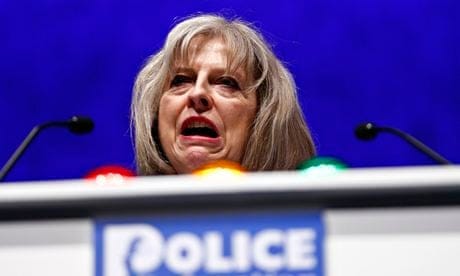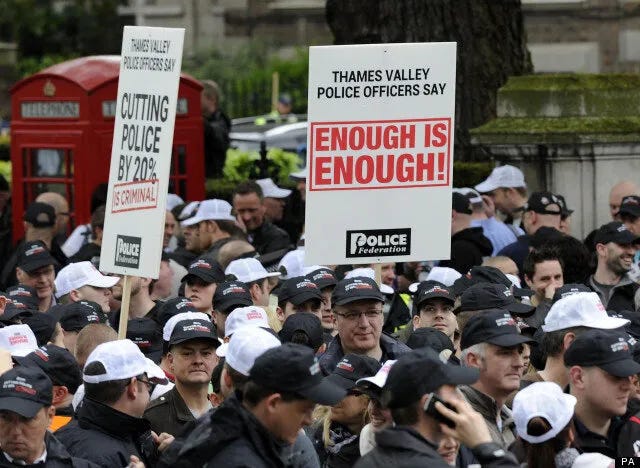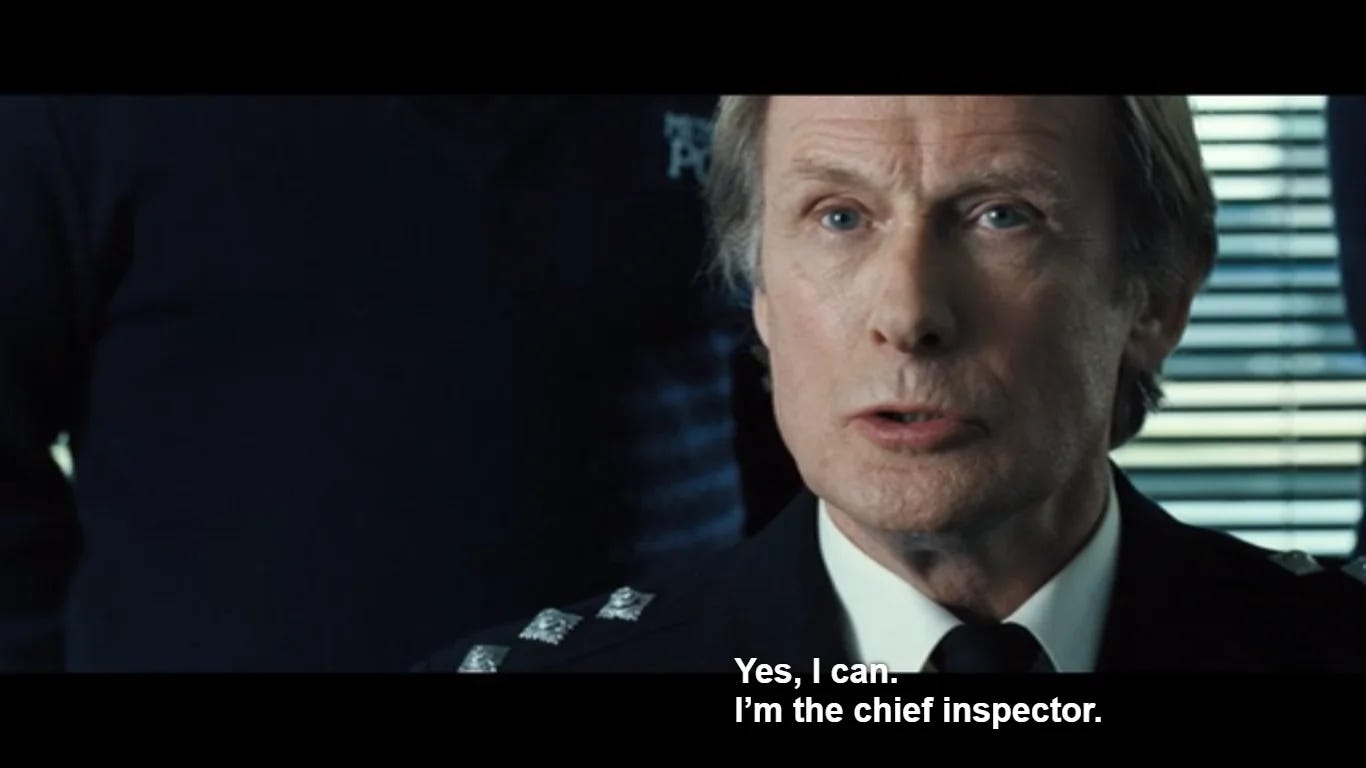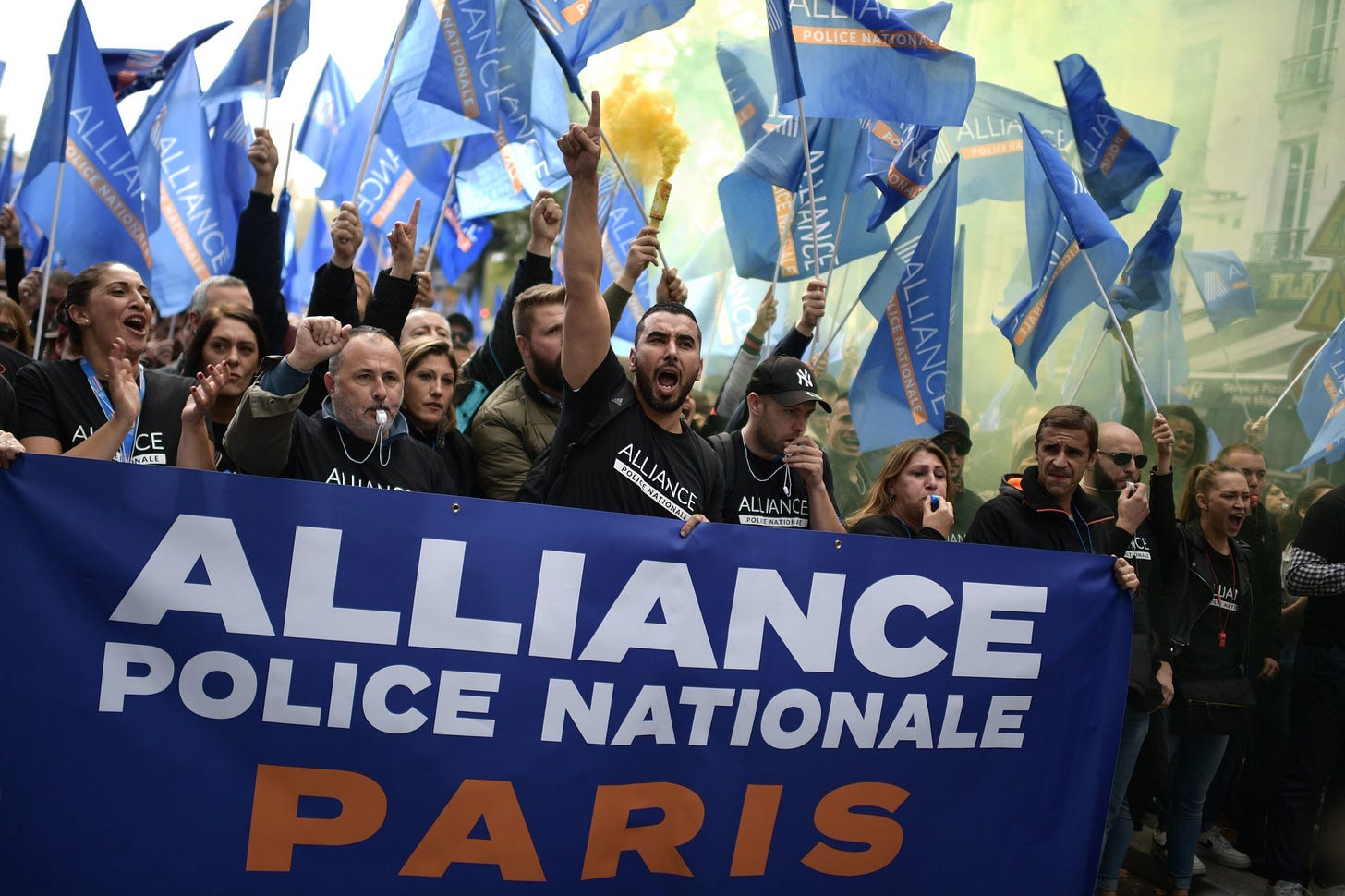Go on, take a bite…
Most of us are familiar with the Old Testament story where a crafty snake tricks Eve into eating a forbidden apple. It all goes sideways from there. Sure, the apple’s sweet, but the consequences are grim.
This reminds me of British police attitudes to trade union representation and, especially, the right to strike. It’s tempting. It would be so sweet. The satisfaction of the look-we-told-you-so feeling of validation as the scrotes rule the streets (well, slightly more than they usually do). The cry from the heart; look what you’ve made us do!
But, afterwards, when the picket line braziers stop smouldering? After the big victory of a small pay rise? There’d be a reckoning. Yes, something would’ve been lost after committing policing’s Original Sin. Not so much an apple bitten. More of a cherry popped.
And so, this week I’m discussing British policing’s perennial flirtation with trade unionism. Although I suspect they’ll never be guests of honour at the Durham Miner’s Gala.
The subject also reveals the tautology of policing as a disciplined service, versus its unhappy transition into a more civilianised organisation. This is most certainly a bug and not a feature - depending on the whims of management, cops are meant to show paramilitary obedience one day, yet be sensitive and bean-baggy the next. In a perfect world, the Police Federation would be the oil lubricating these contradictory gears.
Train drivers had the indomitable Bob Crow. Coppers had Pc Reg Hollis, Sun Hill police station’s Fed Rep, as immortalised in the TV series ‘The Bill’
So why is the Police Federation doomed to fail? It’s because it was designed that way. Imagine being ordered into battle; “it’s going to be bloody dangerous,” you’re warned. “Everyone’s properly tooled-up. They know you’re coming. They’ve prepared entrenched positions; mines, barbed wire, Home Office SPADS, the works.”
You stare, steely-eyed, into the middle-distance. “Okay, where’s my rifle?”
“Rifle? Oh no, you’re not allowed weapons. That would be entirely wrong.”
“Why not?”
“Well, because of your special and unique position in society, old bean. Just appeal to the other side’s sense of fairness. Now, off you go.”
This is the position of weakness the Police Federation finds itself in during negotiations with its hydra-headed monster of bosses (Home Office, NPCC, Police and Crime Commissioners and Mayors). By design, the PF can only negotiate and litigate (the latter easily being its most effective weapon).
Some context: the Government’s just announced a 7% pay raise for police officers (leaving them a mere 17% poorer than they were in 2000). There’s also a new misconduct model on the cards, designed to make it easier to sack police officers - just as Baroness Casey reveals the Met’s run by a bunch of mendacious bullies, many of who are unfit to make such decisions.
Coppers are being paid less and are becoming easier to sack. Funny, really, as fair pay and a disciplinary process taking into account the risk of vexatious complaints are reasons always cited as to why police don’t need a union.
Therefore it’s unsurprising there’s a fresh round of talk about nibbling at the forbidden fruit of industrial action. It’s tempting to dismiss this as typical police grousing. I think, though, this time it’s different. As the impact of the Conservative’s spiteful austerity project becomes apparent, officers young and old (and of increasingly senior rank) increasingly agree; on this turn of the wheel, the Job really is fucked.
‘Stop crying wolf!’
The Police Federation (PF) has been performing trade union cosplay since 1919. It represents the ‘Federated Ranks,’ consisting of Constables, Sergeants, Inspectors and Chief Inspectors. Despite this, or perhaps because of it, there’s no police ‘class consciousness’ - every rank has its own board representing its own (divergent) interests. Superintendent’s have their own association. Above that lies the National Police Chief’s Council for Big Bosses.
In any case, how could a police union be accepted by the TUC? UK trade unions are umbilically linked to the Labour movement. It’s impossible to countenance the police being in thrall to a political party by virtue of industrial representation.
Nonetheless, every time the system screws police officers, the Fed’s more or less powerless. At this point I’m expecting a few angry responses from Federation officials about their work behind the scenes running damage control - to which I’d reply hold your horses. I acknowledge the Federation has, for many, proved invaluable. I’m genuinely grateful for the reps who’ve fought my corner over the years, and the wider PF in general, but being blind to a friend’s faults does them no favours.
It’s a shame how the PF fell from grace. I fondly remember a few magnificently bolshie, barrack-room lawyering fed reps from days of yore - the notionally powerless but wily shop stewards of policing. Once upon a time Tyrannosaurus Federationius roamed the earth, terrifying newly-promoted inspectors with their zero-fucks-given attitude to industrial relations. Many were much, much cleverer than the guvnors they ran rings around.
Police officers protesting against changes to terms and conditions. It made - you’ll be astonished to learn - no difference whatsoever
The PF is, therefore, like the curate’s egg - good in parts. And, sadly, not so good in others. It suffered a possibly irreversible meltdown over the 2012-2015 reforms to police pensions. This episode (probably of marginal interest to non-police readers, so I’ll be brief) created a poisonous schism between the PF and it’s younger members. The optics were horrible - the pension rights of thousands of cops were ‘negotiated’ away by a roomful of PF officers whose age meant they’d no skin in the game.
The PF, in its defence, cited expert legal advice against challenging the pension changes. Yet, in police stations across the UK, disgusted fed reps shrugged their shoulders and admitted the Fed were ‘toothless tigers.’ There was no fire in the PF’s belly (amid a financial scandal at its Leatherhead HQ). The otherwise guileless Theresa May bested them. Imagine that? Being mugged off by the maven of Maidenhead? That’s how little firepower they had available.
Then, to rub salt in the wound, the Fire Brigades Union fixed bayonets and took the Government to court. It won a revision of public sector pensions based on age discrimination.
As a recruit, I remember a terrifying lecture at Hendon from a pugnacious federation rep. He was a jowly late-service constable, suited and booted, with brylcreemed hair and a beer belly. Hands-on-hips, he explained how the Metropolitan Police was run by a mendacious cabal of shysters who’d happily throw you under a bus if and when you made a mistake (he wasn’t far wrong, to be fair).
This, given I was less than a week into my service, was terrifying. He went on to explain the only thing standing between each of us and eternal persecution was membership of the Police Federation of England and Wales (which, incidentally, was never particularly cheap - until you incurred five years’ worth of legal fees after a moody complaint, that is). He handed us all PF registration forms with direct debits attached, and we all - to a man and woman - signed it.
I remember one fed rep, a Falstaffian character demoted from sergeant to constable for some unspecified misdemeanour. He was also an area car driver, the Top Gun pilots of early 90’s police canteens (I feel the need for speed… in a Ford Sierra). When a snotty, newly-promoted inspector parked her flash sports car in the reserved area car bay at the station, the rep wrote ‘AREA CAR?’ across the windscreen in yellow magic marker (the stuff traffic cops used to mark accidents on roads).
The inspector, was (as if things couldn’t get any better) an accelerated promotion officer of limited experience and even less charisma. When she saw the graffiti on her car windscreen, she demanded to know who the culprit was. It was 06.00, the end of the night shift. When everybody stayed schtum, she said, “well, nobody’s going home until someone tells me who did it!”
The fed rep (who, it will be remembered, was the guilty party) stepped forward. “Ma’am,” he said, making a show of looking at his wristwatch. “Are we on overtime?”
“No,” said the inspector. “Of course not.”
“Are we all under arrest, perchance? Is there an allegation of criminal damage?”
“Don’t be silly.”
“Is this an exigency of duty?”
“I don’t think so.”
The fed rep smiled. “In which case, police regulations state you’ve no right to keep us here. So we’re off home. Next time, why not park your private car on the street like everyone else has to? Ma’am.”
The inspector, fuming, said nothing. Hopefully, she learned a lesson (of course, she went on to achieve significant rank). That was classic old-school fed rep behaviour - keeping management on their toes, pointing out double standards and not giving a fuck about putting noses out of joint.
The old-school Fed Rep says, ‘no you can’t - I know the regs.’
The Job, like the rest of society, became more corporate. More managerial. More joyless. Fed reps spent less time looking out for the troops and more time firefighting childish office disputes. Fed reps are obliged to represent obvious wrong ‘uns, too - on DPS I saw a few who thought they were Perry Mason, even though the person they were representing was as guilty as sin. They were given short shrift by anticorruption detectives of the same rank. We were federation members too, by the way.
I was lucky. When I badly needed a fed rep, I found a genuine blinder - a diplomat with a fiery appetite for justice. He was flooded with work, though, because too many other reps weren’t. Some took the job to avoid proper policing. A few even saw it as a development opportunity (and, to be fair, it’s great experience in terms of training and experience around workplace issues). You’d still happen upon bolshie, old-school, guv’nor riling dinosaurs… but even they saw the fiery meteor of modernisation hurtling towards them.
In my experience, conversations about industrial action aren’t uncommon among police officers. This isn’t even remotely scientific, but I’d say 60% of my colleagues were against and 40% opaquely in favour. I say opaquely because support unravelled when you got down to brass tacks. Some would argue we needed a union… with the caveat, “although I’d never, ever personally go on strike.”
“In which case, why do you need the right to strike?”
“Well, as a threat.”
“Okay, but why wouldn’t you strike?”
“‘Goes against the grain, doesn’t it?”
And there, dear reader, lies the rub; industrial action as a weapon of mutually assured destruction, never to be deployed, gathering cobwebs in its silo. It doesn’t work that way - industrial action’s a weapon that needs to be drawn from its scabbard. And I speak as someone who, by inclination and political conviction, would be unlikely to ever join a trade union.
As things stand, the credo of duty - ruthlessly gamed by politicians and management - remains more or less intact. The same thing happened when the PF once suggested a work-to-rule strategy, which basically meant ‘actually do all the stupid shit management demand you do’. A daily inspection of a police vehicle before going out on patrol can take a barrack-room lawyer an hour. Yet as soon as an emergency shout crackled over the radio? The work-to-rule was forgotten.
Police firearms officers carry weapons on a voluntarily basis. Yet this potential lever is never pulled when the shit hits the fan
I’ll offer an example; the experience of police firearms officers provides an excellent case study in how little appetite exists for collective action.
UK Police rarely shoot people dead, but when they do it often becomes a leitmotif for wider issues around racism or police brutality. A new judgement also means pulling the trigger is more likely to see officers losing their jobs via a ‘double jeopardy’ process. A process, incidentally, I think is likely to be used by senior officers in order to assuage critics (‘we couldn’t jail them, but we sacked them’).
Yet armed police have a ridiculously easy lever to pull - they can simply hand in the ‘blue tickets’ which authorise them to carry weapons. They’re volunteers. There’s no way to force them to draw guns from an armoury. In London, for example, the Government’s GSZ (Government Security Zone) would crumble (there aren’t enough Ministry officers from the MoD or BTP to cover). Airport security? Diplomatic protection? Ditto. That’s before we even mention bread-and-butter ARV teams providing primary armed response to protect the public. And what of armed surveillance and protection officers?
It would be chaos. They’d have the Government over a barrel. They’d have to ship in officers from outside London, most of whom have barely enough armed capacity for their own force areas. That leaves the army. Ouch.
Yet it’s never happened. Nor is it likely to, illustrating some important cultural issues within UK Policing. The playbook usually goes something like this:
There’s a ‘bad’ shooting and the balloon goes up before the facts are fully established (media and community fury, potential disorder)
A firearms officer is treated as a suspect by the IOPC and, increasingly, their force. There are immediate demands for criminal charges by community leaders and the wider activist Left
Ham-fisted management decisions are made in an attempt to keep all sides happy, while simultaneously making all sides even angrier
Firearms fed reps make it known through back-channels that firearms teams are thinking of handing their tickets in
A Very Senior Officer visits the troops, pats them on the head and blows smoke up their arses
The troops do not, in fact, down tools. It’s often - but not always - turns out the shooting was justified in the circumstances
Return to 1. Rinse and repeat
Why do armed officers never pull the doomsday lever? I was once an AFO. I’ve also had many conversations with highly experienced firearms people on this subject (they’ll talk to anyone for a packet of crayons). People who’ve been involved in police shootings. I also know people who’ve investigated police shootings. Their replies, I think, help explain why unions won’t currently work for UK Policing:
“They’ll never put their guns down. They’d have to go back to driving panda cars.”
“There’s no solidarity. If half the unit put their guns down, the other half would cover their shifts for the money.”
“They can’t afford to put their guns down. They need the overtime.”
“Some of the guys doubt they’ll ever shoot anyone and don’t care about anyone else.”
“They genuinely think they’re on the side of the angels.”
“Someone has to do it.”
Now, if little old me knows this stuff, you think the seniors at Scotland Yard don’t?
At this point, I suspect the average TUC negotiator would begin sobbing into their beer and sandwiches.
French police have a proper all-singing, all-dancing, all-striking trade union
This is, of course, a very British phenomenon. Cops are trained from Day One that they belong to a disciplined service that doesn’t strike. In other countries, though, police unions are common. France immediately springs to mind, with its union’s splenetic condemnation of rioters as ‘vermin’ and Millwall-esque attitude of ‘everybody hates us and we don’t care.”
Of course, whether the British public would tolerate the rather, ahem, robust French policing style is another question. Maybe we should pay our police properly, in case that’s what we end up with, eh?
And there’s something else NPCC ranks don’t like talking about - key elements of UK policing are already unionised. Police staff are fully unionised. At one point, ‘MetCall’ (MPS emergency command and control) was deemed a strategic weak point by the MPS due to industrial action by Unison. PCSOs are unionised. Forensic examiners are unionised. Everyone except sworn officers are unionised.
Has the Rubicon been crossed by default? Police terms and conditions aren’t that much better than those of unsworn staff nowadays. They’re free to take a bite from the forbidden apple if they feel the need.
It’s certainly within the gift of the Home Office and NPCC to stop the snake whispering in police ears. Yet they won’t, for time-honoured reasons of hubris, parsimony and neglect. They’ll keep salami-slicing terms and conditions. They’ll carry on salting the fields in which police officers work. They stick their fingers in their ears and sing la-la-la. They revel in short-termism, playing oh-so-clever 4D chess as they lay bear-traps for the next government. There’s always a tipping point, though. When this one happens (and I think it will), it will be nasty.
Levers will be pulled.
Not that it matters. The five-year electoral cycle will turn. Chief constables will write valedictory memoirs. Knighthoods, MBEs and KPMs will be awarded. Theresa May will defend her brave stand against the brutish Police Federation, even though her book will languish in a bargain bin. A new inquiry into police corruption will demand action.
And so the relentless wheel of British public life will turn. If it squashes a few coppers along the way? Events, dear boy. Events.











You could add a bit about the recent employment tribunal judgement whereby PFEW were in bed with HMG and did their colleagues legs. https://www.gov.uk/employment-tribunal-decisions/mr-l-broadbent-and-others-v-police-federation-of-england-and-wales-3207780-slash-2020-and-others
As ever an excellent read, some chuckles, some issues relative to me, but the one thar that stuck out is the PF v Trade Union debate.
I retired in 2009 after 32.5 years as a Bobby, I rejoined the following day as a 'civvie'' or Police Staff.
In fairness I was anticipating that my union membership, just might carry a little more clout, but when the wheel came off for me after my 14th year as Police Staff, do you know what?
They were bloody useless.
A senior Union rep told me I COULD make a grievance report, but to be honest it wouldn't go anywhere, he then dropped off the radar, only reappearing when I wrote a report saying how I felt abandoned by him and the Union, then he disappeared again.
You are correct that it is very unlikely that the British Police will ever strike, but it's not impossible that day may come sometime in the future.